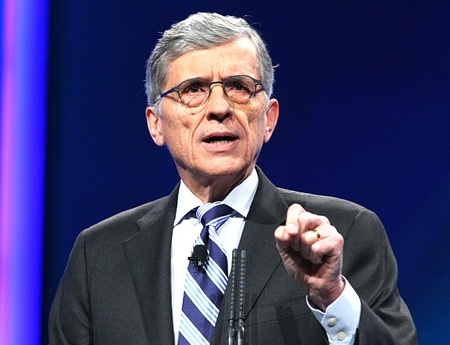Wheeler on TWC/Charter: Absence of Harm Not Enough

The smarter way to stay on top of broadcasting and cable industry. Sign up below
You are now subscribed
Your newsletter sign-up was successful
In announcing the news of the $78.7 billion Charter-Time Warner Cable deal, the companies played up the competitive and public interest benefits.
They said the deal will drive "investment into the combined entity’s advanced broadband network, allow for wider deployment of new competitive facilities based WiFi networks in public places, and the footprint expansion of optical networks to serve the large marketplace of small and medium sized businesses. This will result in faster broadband speeds, better video products, including more high definition channels, more affordable phone service and more competition, for consumers and businesses."
The FCC is looking to boost broadband speeds, so that should be an important talking point for the deal. But the Comcast/TWC deal tanked on the combined broadband sub count, speed notwithstanding, so broadband can be a double-edged sword.
"With a combined scale of 17.4M video and 19.9M broadband subscribers (defined as any-speed-broadband counts), one has to be sober about genuine risks that this deal could still be rejected," said MoffettNathanson analyst Craig Moffett Monday (May 26).
Wheeler made clear the FCC would be looking for value added for consumers, not just that the deal would do no harm. While the Justice Department will be looking at antitrust, the FCC will look for public interest benefits out of the combo.
“The FCC reviews every merger on its merits and determines whether it would be in the public interest," Wheeler said in a statement. "In applying the public interest test, an absence of harm is not sufficient. The Commission will look to see how American consumers would benefit if the deal were to be approved.”
Adonis Hoffman, former chief of staff to FCC commissioner Mignon Clyburn and now chairman of Business in the Public Interest, sees a big difference between this deal and the Comcast/TWC merger, which also involved Charter in some attendant spin-offs.
The smarter way to stay on top of broadcasting and cable industry. Sign up below
"This transaction is qualitatively different than Comcast in that Charter's corporate reputation is benign or neutral," said Hoffman. "The adverse public interest concerns of the previous deal will not be a factor in this deal—and that bodes very well for its approval."
"Like any transaction of this size, the proposed Charter - Time Warner Cable - Bright House transaction will receive scrutiny from the FCC and the Department of Justice and the public," said Free State Foundation President Randolph May. "But I hope that such scrutiny will focus on the merits of the transaction and not hyperbolic reactions from some quarters that characterize many media and telecom combinations."
Contributing editor John Eggerton has been an editor and/or writer on media regulation, legislation and policy for over four decades, including covering the FCC, FTC, Congress, the major media trade associations, and the federal courts. In addition to Multichannel News and Broadcasting + Cable, his work has appeared in Radio World, TV Technology, TV Fax, This Week in Consumer Electronics, Variety and the Encyclopedia Britannica.

